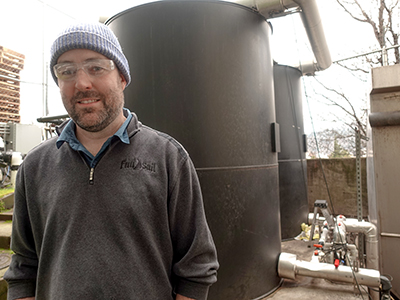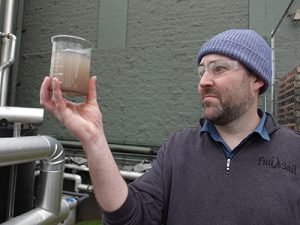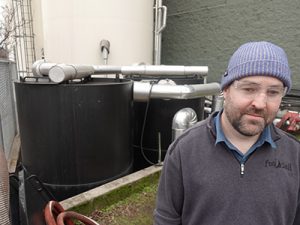
Pretreated wastewater win-win for local business and City

It may come as no surprise that all wastewater is not created — or treated — equally. Breweries in particular place an outsized burden on wastewater facilities, but recently these users of Hood River’s Wastewater Treatment Plant have improved discharge quality, saving costs while easing loads on the City’s infrastructure. Full Sail Brewing Company most recently achieved significant success in this area by improving its pretreatment system and the results have caused City officials to take notice.
“Reductions in load are important because they increase capacity for future residential or commercial growth, thereby allowing the City to defer solids or nutrient loading-related plant upgrades,” explains City Engineer Stoner Bell.

Businesses can pretreat wastewater through filtration and aeration to reduce levels of organics that require treatment before release. The strengths of these organics are measured in two ways, namely total suspended solids (TSS) and biological oxygen demand (BOD). Full Sail has been on a pretreatment program for over 10 years but were more recently incentivized to reduce organics levels further. In 2018, average TSS was reduced 52% and BOD 35% compared to 2017 averages. This is despite flows increasing over the same time period, so while business is growing, the impact on public infrastructure is lessening. “To put this in perspective, the improvements Full Sail has made are comparable to removing the impact of over 68 Hood River residents.” Stoner summarized.
“We noticed significant drops with Full Sail’s organics in a short matter of time, and they tell us the brewery continues to be proactive in reducing impact on the City’s treatment plant,” reports Louie Hooks, project manager for Jacobs, Wastewater Treatment Plant (WWTP) operator for the City. “Their investments and diligence are reducing the company’s impact on the City’s collection system, for sure.”
Breweries’ wastewater can be extremely high loading, and Bell says other microbreweries are nearing concentrations that could move them from the medium-commercial to industrial permit category. “If we take all micros together, it’s having an impact on the system,” Bell shares. “We are working with them, and some are already choosing to implement best management practices involving things like ‘side-streaming.’” Side-streaming removes organic solids from wastewater and redirects it for agricultural purposes, reducing high organic loads to the plant.
Full Sail is the first Hood River brewery to implement industrial scale pretreatment measures, however Hood River Juice Co. initiated similar practices when the company moved to its waterfront building.
According to Full Sail Brewery’s Quality Assurance Manager Kevin McCabe, Ph.D., an aging, undersized clarifier was replaced in 2016 with two larger clarifiers and better solids removal capability. Their treatment system consists of two large bioreactor tanks in series, followed by the two new clarifiers in parallel. In the bioreactor tanks, they adjust pH and provide the microbes oxygen to break down sugars and reduce BOD. As these microbes grow, they create bio-solids which are removed by the clarifiers and returned to the first bioreactor tank to start the process over again. Out the other end of the clarifiers flows water with reduced solids and BOD destined for the City treatment plant.”

“These new clarifiers, along with minor process changes have led to these reductions, and our good working relationship with the City is essential to being able to make these improvements,” McCabe explains. “These process improvements are in line with Full Sail’s environmental stewardship goals, and therefore increased costs to haul solids for composting are justified. It’s all part of improving our processes from our front door to our back door and beyond, striving to create a better product with less environmental impact.”
Please consider signing up HERE to receive quarterly Emails of future editions of Hood River City Connect.
Si le gusta lo que acaba de leer, considere inscribirse AQUI para recibir correos electrónicos trimestrales de futuras ediciones de Hood River City Connect.